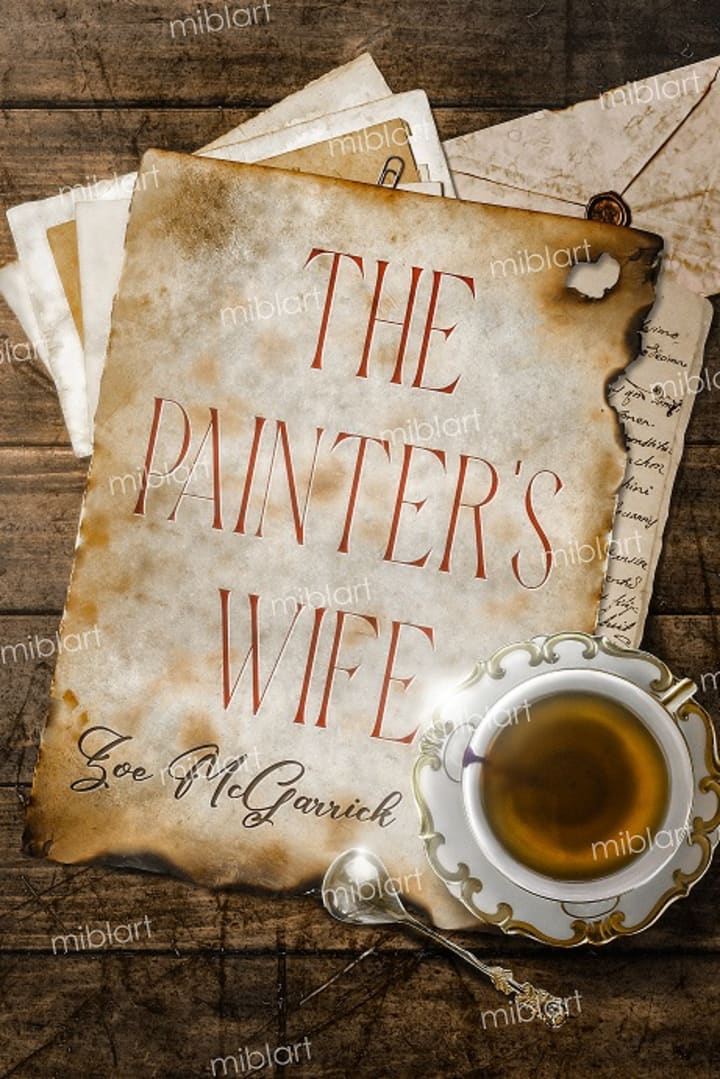How To: Write a Book
and learn from your mistakes

Back when I was a kid all I ever wanted to be was an author, (except for that brief year I wanted to be a mermaid) but I had I imagined, albeit stupidly, or to put it more nicely; naively, that this meant just writing a book.
Nope. I wish.
Well, actually, to some degree, yes. But even that was more complicated than 10-year old me thought.
Writing a book takes so many stages, and some vary a lot depending on the writer that you are. For instance, do you like to meticulously plan ahead? Scene by scene? Or do you rush in, guns blazing, not knowing what point of view you'll stick with, where it's set or what it's about?
Yeah, maybe that's another post all on its own.
When it came to my book The Painter's Wife, it was a bit complicated.
Weirdly, it began as an opening chapter for my English Literature A level coursework (got myself a good grade I'll have you know), and then it lay in a sad folder on my bookshelf while I ran off to uni. I thought, maybe, that I'd have time to write it eventually but... Nope. Despite only having about 3 lectures a week, you don't have a lot of time to write a book. Who'd have thunk?
So, when it came to the break before my second year, I wrote a different book within a month. It is still in its own sad folder on my bookshelf. But it didn't feel right and had a lot of work it needed, so I put it to the side, and came back to The Painter's Wife... In lockdown.
Oh yes, sorry to bring it up but 2020 was a turning point for a lot of us. I had just finished my third year at uni, moved back in with my parents, locked down, with no job, and had a lot of time on my hands. So, out of the sad folder it came, and a good 50k words later, it was done before I started my masters.
Now how to actually write a book:
Step 1: Cry
No I'm joking, but this is the part where you will actually have to write something. And I know all of us seem to do anything but that when it comes down. I have attempted to make clay earrings to avoid this step myself.
We don't want it to be terrible but, I always go back to what the problematic yet honest Ernest Hemingway had to say about that:
"The first draft of anything is shit."
Those words have inspired me ever since 15 year-old Zoe read them.
Get a notebook and jot down the idea - make it concise and then bullet point other details that spring to mind: A scene idea, a theme, a phase you desperately want in there. Anything. You might not include everything in the end (it won't always feel right) but this helps you to start.
Now add a bit about your character, the one you're writing about most. Does it begin with them? Does it begin with someone else talking about them? What is it that makes you want to write about them? And, most importantly, why are they in this story?
Step 2: Re-write it all out again
Okay well, let's say you now have a shit first draft. Give it a few days. Go have fun, go zorbing, chase a hula hoop. Whatever you do for fun, I don't care.
Now for the edit. And then the edit. And the edit.
And the rewrites, of course. By then time this tage is over, you will be disgusted with your own work, able to recite the whole 56,000 words by heart, and cringe when someone reads it aloud.
You do this phase as many times as it needs. Do your line edits, your rewrites, your redrafts. Some people rewrite their manuscript three times, some thirty. Up to you and your book. It's a stage that will drive you crazy....
Does that sentence look right? Is that how you write 'because'? Who is this speaking? What colour are their eyes again?
Again, tip: keep those small details (eye colour, allergies, nervous tics, etc) of your characters in the notebook we talked about in step 1. I still need to work on this tip. If someone's eye colour changes in chapter 12... no it didn't.
Step 3: Beta readers and Proof readers
You can ask your friends for this. Hell, I even got my mum to.
But a little explanation is in order;
Proof reader: identifies any grammatical or spelling errors, or highlights any areas where the writing itself does not make sense.
Beta readers: are more concerned with the story. They are your first audience. Their feedback will tell you if it is a book worthy of Waterstones table stacks, or if it'll collect dust in an old library 30 years from now. Beta readers will tell you how thye felt about a character, plot twist, tone,... all that jazz. They are key to figuring out what actually needs to change in order for it to be a finished novel.
So, two rules:
- Don't get upset - criticism is so so useful. And a good beta reader is never going to be mean, per say.
- Listen. Don't just shirk the comments off and think "well obviously you didn't get it." Get off your high horse and listen and take notes. They didn't get it? Well, how can we change that? If you really feel unsure about your feedback you can always get another round of beta readers in. There are sites online where you can pay for beta readers, do a quick google search. The more the merrier. I wish I had gotten more people to read it first, but I have taken this into account for the next book.
Step 4: finished (and ISBNS)
So now you're done. But wait! Time to format the whole thing to look like an actual proper manuscript. You can do this by following simple steps after a quick google or, if you're self-publishing, wherever you use (KDP or Ingramspark) will have an easy to use template to follow.
Little did I know another key part will be organising your book cover. I used mibleart.com for mine, who made this beauty:

You can use Fiverr, Deviantart, or try it yourself using Canva. Luckily for my next book I have a talented friend to help me out. But remember to give full details of the blurb, design you want, colour palette, sizes (size is very important, and if you're wondering trade paperback sizes will range anywhere from 5.5” x 8.5” to 6” x 9” - important to know for your book size, and trim sizes, but more on that another day).
On top of all this, you'll need ISBNs at the ready.
ISBNs are the little reference codes for every book. If you want to sell a print and ebook versions of your book, then make sure to use two different ISBN codes for each of those. Luckily you can buy these easily and in blocks, but, unluckily, they do come quite expensive, so keep track of where you put them... I need to remember that.
Step 5: Marketing
You've written (and rewritten) the book, got a cover, a distributor, etc etc, now to market it. This is the part I could not figure out. The way we view things and feel drawn to anything has changed so much and will continue to do so at a very fast pace. So whatever gets your attention, start there. I posted silly TikToks and Instagrams (and still do).
Also, turning your Instagram or Facebook into a business account, means you can run ads - which proved very useful.
In fact, you should already have a social media platform that is about your book or writing. Post consistently about your writing, and what not, the release date, cover reveals, a bit about the plot, snippets, all the good stuff, and you should be okay.
But I will say this was a struggle. Now I know, having had to go through this alone and basically winging majority of it, to plan ahead, keep a budget aside for this part, the more you buy better ads, the more people you'll reach; the more likely you'll find your audience.
It takes practise though.
But look at you, you wrote a book!
About the Creator
Zoe McGarrick
I am new writer, soon to be author, interested in writing articles all things literature, book reviews, book culture and my journey! Stick around to stay updated; follow me on Insta and TikTok @authorzoemcgarrick
Reader insights
Nice work
Very well written. Keep up the good work!
Top insights
Expert insights and opinions
Arguments were carefully researched and presented
On-point and relevant
Writing reflected the title & theme






Comments (1)
Thank you for taking us through your journey to publish your book. Really enjoyed this